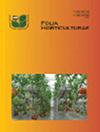The effect of osmotic stress, lighting spectrum and temperature on growth and gene expression related to anthocyanin biosynthetic pathway in wild strawberry (Fragaria vesca L.) in vitro
IF 1.8
4区 农林科学
Q2 HORTICULTURE
引用次数: 0
Abstract
The goal of this research was to evaluate the effect of light, temperature, sucrose and PEG on the growth of渗透胁迫、光照光谱和温度对离体野生草莓(Fragaria vesca L.)生长及花青素生物合成途径相关基因表达的影响
本研究的目的是评估光照、温度、蔗糖和 PEG 对离体雌花苷(Fragaria vesca)生长以及花青素生物合成所必需的调控基因 Myb10、WD40 和编码酶基因 CHI、CHS、DFR、EGL、F3H 和 UFGT 表达的影响。我们观察了植物对渗透胁迫的反应、生长和小芽重量的下降。在蔗糖浓度过低的情况下,研究基因的表达发生了明显变化。在培养基中添加 PEG 会导致小芽重量和基因表达量减少。LED 照明系统的蓝光+红光显著影响了离体小芽的生长。红光和蓝光+红光+紫外光略微降低了小芽重量,并使叶柄呈红色,这表明花青素合成增加。此外,当嫩枝暴露在蓝光、蓝光+红光和蓝光+红光+紫外光下时,大多数研究基因的表达量都呈上升趋势。温度为 15°C(相对于 22°C)会显著降低小芽的平均鲜重,同时增加 CHI 和 CHS 基因的表达,降低 WD40 基因的表达。暴露在较高温度(30°C)下可诱导微芽玻璃化,但鲜重与对照没有差异。基因表达也取决于暴露时间的长短。对于 CHS,暴露 1 周后基因表达量保持不变或有所增加,暴露 4 周后则有所减少。
本文章由计算机程序翻译,如有差异,请以英文原文为准。
求助全文
约1分钟内获得全文
求助全文
来源期刊

Folia Horticulturae
Agricultural and Biological Sciences-Horticulture
CiteScore
3.40
自引率
0.00%
发文量
13
审稿时长
16 weeks
期刊介绍:
Folia Horticulturae is an international, scientific journal published in English. It covers a broad research spectrum of aspects related to horticultural science that are of interest to a wide scientific community and have an impact on progress in both basic and applied research carried out with the use of horticultural crops and their products. The journal’s aim is to disseminate recent findings and serve as a forum for presenting views as well as for discussing important problems and prospects of modern horticulture, particularly in relation to sustainable production of high yield and quality of horticultural products, including their impact on human health.
 求助内容:
求助内容: 应助结果提醒方式:
应助结果提醒方式:


